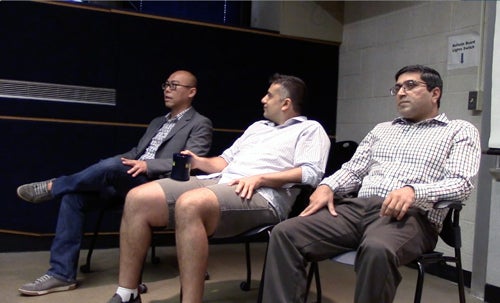Pursuing non-traditional career paths is becoming more and more common in chemical sciences as new data analysis and computer programming skills are becoming an important component of many fields of chemistry.
On September 15, 2017, CALC|UM held a panel discussion, with Karunesh Arora from Ford Company, Shreya Bhattarai from Google, and Sean Law from TDAmeritrade, to introduce data science and software engineer careers to chemistry graduate students and post-docs.
The townhall style panel discussion led to very interesting topics on venturing into industry jobs after PhD. The panelists discussed the challenges for transitioning from an academic work environment to industry setting. Learning new sets of skills and being able to work in a collaborative work environment seemed to facilitate such transition. For example, all three panelists are currently working on projects that are far from what they pursued during their graduate careers. However, they seem to agree that during the graduate career they gain skill sets that help them learn new things required for the job in an effective manner. In terms of collaboration, they definitely emphasized the need of networking within the company in order to succeed. Most of the times that might mean setting up lunch program with colleagues and discussing projects and ideas. Furthermore, upon asking what could we do to prepare ourselves to get our feet into data science and software engineer career pathways, all the panelists shared some vital information that is worth sharing. Data science and programming courses on online platforms such as coursera, Edex from MIT, CS50 from Harvard, etc are helpful in learning as well as putting them on the resume. HackerRank seemed to be very important with these type of jobs as many software companies ask whiteboard type problem solving questions during the interview process. Furthermore, there is an online test from HackerRank that upon completion your score can be sent to different companies for review. However, these tests and online courses are meant to expose to various aspects of programming and data analytics. The most important task is to actually apply the learnt skills to an application of your own. Lastly, these panelists emphasized that the research aspect of academics is still present in industry for data science and software engineer careers, especially with the field growing at a fast pace. Overall, the panel highlighted that with the training we go through during our graduate career it seems that careers in data analytics and software engineer are definitely good alternative paths from academia for chemistry graduate students and post docs.


